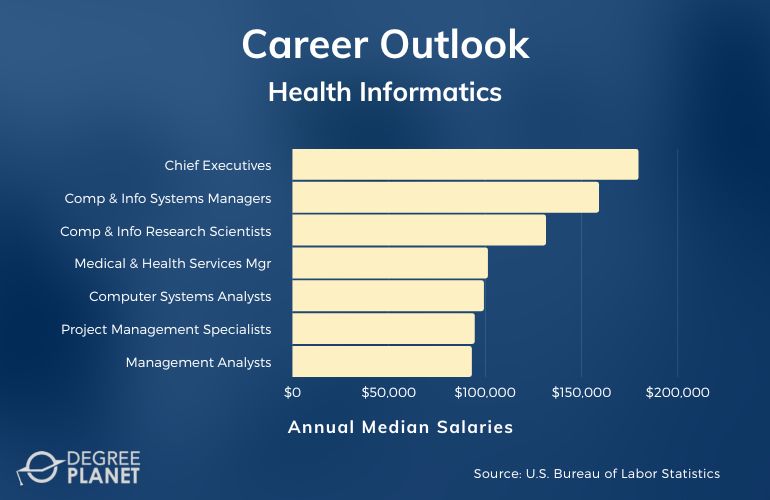If you want a career that brings together data science and healthcare, then you might consider pursuing a masters in health informatics. This is an emerging field with opportunities to improve healthcare delivery, track health trends, and cut medical costs.

At the master’s level, you may become an insightful data analyst with programming, project management, and information security skills.
Editorial Listing ShortCode:
Thanks to your specialized training in healthcare, you could be uniquely suited for a role in a hospital, a health department, a pharmaceutical company, or a residential care facility.
Masters in Health Informatics Online Programs

Healthcare organizations amass large quantities of data, and health informatics professionals know what to do with it.
Editorial Listing ShortCode:
This field draws on knowledge from multiple disciplines. There’s some data science involved, and computer science plays a role as well. So do business concepts, especially those related to the business of healthcare delivery. If you want to get a health informatics MS, you can expect to study topics like:
- Biostatistics
- Data analytics
- Data mining
- Decision-making
- Electronic health records
- Epidemiology
- Health data privacy
- Health information management
- Machine learning
- Python programming language
- Visualization
Most programs begin with a set of core classes. You may have opportunities to take electives as well. In an elective course, you can take a deep dive into topics that are of special relevance to your intended career. Some schools offer pre-designed concentration tracks to help you specialize. Examples include:
- Healthcare mobile technology
- Clinical informatics
- Informatics leadership
Online studies are common for informatics master’s degrees. Distance classes are flexible, which is an asset for working students. You might be able to hold down a full-time job while doing schoolwork at night or on the weekends. If you currently work in healthcare, you might be able to apply some of your lessons right away.
Masters degree programs sometimes require students to write a thesis before graduation. That typically involves a research project and an accompanying paper. Health informatics master programs without thesis requirements may include capstone projects instead.
With a masters in health informatics degree, graduates might end up working in a hospital, a physician’s practice, an outpatient center, or a nursing facility. Other jobs could be available in companies that produce medications or medical supplies.
Possible job titles include clinical analyst, information systems director, IT project manager, or healthcare information officer. Another possible career opportunity could involve working for a research firm. There’s also a chance that professionals with a masters could teach health information management classes at the college level.
Health Informatics Careers and Salaries

Informatics professionals work with data, and there are many data-related jobs in today’s healthcare organizations that could be a good fit.
Potential employers include hospitals, public health departments, nursing homes, and medical supply or pharmaceutical companies. Some professionals work as analysts, analyzing healthcare data to spot trends or solve problems. Their efforts may influence how an organization structures its workforce or responds to patients’ needs.
In healthcare settings, analysts often carry the job title of clinical analyst. Some clinical analysts focus on the computer and IT systems in an organization. They may evaluate whether the systems are working well and meeting the organization’s needs. If they implement upgrades, they may be known as IT project specialists or project managers.
According to the Bureau of Labor Statistics, jobs in the computer and information technology sector pay a median of $97,430 per year.
| Careers | Annual Median Salaries |
| Chief Executives | $179,520 |
| Computer and Information Systems Managers | $159,010 |
| Computer and Information Research Scientists | $131,490 |
| Medical and Health Services Managers | $101,340 |
| Computer Systems Analysts | $99,270 |
| Project Management Specialists | $94,500 |
| Management Analysts | $93,000 |
| Operations Research Analysts | $82,360 |
| Health Information Technologists and Medical Registrars | $55,560 |
| Medical Records Specialists | $46,660 |
While the median salary for medical records specialists is $46,660, having a master’s degree could put you in a supervisory position. The top earners in that job category make over $74,200 each year (Bureau of Labor Statistics).
Not everyone who studies informatics becomes an analyst. Some focus on collecting and organizing medical records. A masters degree could be useful for people who lead records teams. All of these departments require managers. A masters degree could also be a strategic step toward securing a management role in health services, information systems, or a related department.
Editorial Listing ShortCode:
Chief information officer (CIO) is one of the top executive roles in some organizations. A CIO is typically over all the managers in the information department. There could be research or teaching jobs available with this degree too. The possibilities could include teaching college classes or being an information scientist who contributes to new technologies for use in healthcare settings.
Master of Health Informatics Curriculum & Courses

The curriculum in an informatics program will help you become more knowledgeable about healthcare, data analysis, and computer technology.
For your master degree in health informatics, you might take:
- Biostatistics: Informatics professionals often work closely with biostatisticians, so you may have a class on the use of statistics in the fields of health and biology.
- Database Administration: This class will teach you to develop databases, improve upon them, and make the most of the information they contain.
- Healthcare Business: To prepare you for jobs in this industry, you may have a course on healthcare finance, staffing, and other business principles.
- Healthcare Decision-Making: This class may focus on using data and decision-making techniques to guide the choices made in healthcare settings.
- Informatics Data Science: You’ll learn how to use algorithm software and mathematical tools to solve numerical problems.
- Informatics for Public Health: There might be a course that focuses specifically on the role that informatics can play for public health providers and the people they serve.
- Programming: You might become more knowledgeable about general programming principles and develop your expertise in a particular language, such as Python.
- Project Management: The curriculum in this class will teach you how to lead informatics projects and respond to obstacles—whether from people or the limitations of technology.
- Security of Data: It’s important to know how to safeguard data and follow privacy laws.
- Systems for Health Information: This course will look at the major systems used for the management of health information, such as medical coding and digital records.
The credit requirements can vary widely. For instance, some schools require only 30 credits, while other programs consist of 45 credits or more.
How to Choose an Online Masters in Health Informatics Program

There are multiple health informatics online programs to choose from. If you’re unsure which is best for you, it helps to consider what you’re looking for in a school. Identifying your preferences can help you narrow down your options.
Common considerations include:
- Academic terms. Some online programs have traditional 16 week terms and a summer break. Others hold year-round terms, with each lasting 6 to 10 weeks.
- Accreditation. It’s strategic to select a regionally accredited college that also has programmatic accreditation from CAHIIM.
- Credit requirements. Some programs are only 30 credits long, while others are 45 credits or more. Shorter programs can usually be completed more quickly and may cost less, while longer programs may go more in-depth.
- Electives or concentrations. You might want to pick a program that offers classes or concentration tracks that are directly relevant to the career you plan to pursue.
- Thesis requirement. Not all schools require a research thesis before graduation. Non-thesis studies may go more quickly. Other colleges may end the program with a real-world capstone project.
- Transfer rules. If you’ve taken health informatics classes before, you might want to select a college that will let you transfer in those credits.
It’s beneficial to pick out several potential programs and then talk to admissions counselors at those schools to learn more.
MS in Health Informatics Admissions Requirements

Before applying to health informatics programs, it’s helpful to check and make sure you meet the admission requirements.
For example, it’s often required that you hold an accredited bachelor’s degree. Schools may also verify that you earned a particular GPA or studied a certain subject. The admissions process might require submitting:
- College transcripts
- GRE scores (not required at all colleges)
- Recommendation letters
- Resume
- Statement of purpose
It’s helpful to pay attention to the admissions deadline and to submit all documents well in advance.
Masters in Health Informatics Programs Accreditation

Regional accreditation is a respected mark of quality in the world of higher education. Choosing to attend a regionally accredited school is a beneficial decision.
Regional accreditation leads to valued degrees, so employers often prefer candidates who have been to accredited schools. Plus, accredited coursework may be transferrable. Other schools may have policies of accepting credits only from regionally accredited colleges.
Editorial Listing ShortCode:
Accredited master’s degrees can also show that you can perform at a high level. They may help you qualify for doctoral programs.
CAHIIM Accredited Health Informatics Masters Programs
In addition to regional accreditation, it’s strategic to pick a program that’s accredited by the Commission on Accreditation for Health Informatics and Information Management Education (CAHIIM). This organization evaluates colleges’ programs related to health information. That includes health informatics and health information management.
If you get a CAHIIM accredited education, you can rest assured that your studies align with current industry standards. In fact, certain certification programs may require applicants to have attended a CAHIIM approved school.
Financial Aid and Scholarships

Students often rely on government financial assistance when earning a graduate degree. As a graduate student, you are most likely to benefit from government loans.
Both states and the federal government offer such programs. Your workplace could be another source of funding. Especially if you already work in a related role, your employer might be willing to help you hone your skills.
Scholarship opportunities could come directly from your college. In addition to institutional scholarships, you can also apply to outside scholarship programs. To get started with your financial aid search, you can fill out the Free Application for Federal Student Aid (FAFSA).
What Is a Masters in Health Informatics Degree?

A masters in health informatics degree is a graduate program that draws from several disciplines, including computer science, data analysis, and healthcare business.
This type of degree prepares students to become leaders who can expertly evaluate health data. Their findings are useful in epidemiology, public health, and healthcare delivery. Since this is a masters degree, it’s often earned after getting a bachelors degree. On average, master’s degree programs take about 1 to 2 years to complete.
This is not a terminal degree. Some students continue their studies with a doctoral degree after completing a master’s program.
What Can You Do with a Masters in Health Informatics Degree?

With a masters degree in health informatics, graduates might work as computer systems analysts who work with healthcare organizations’ technology systems. In that setting, they might be called clinical analysts.
Management roles are also common for professionals with graduate degrees. The Bureau of Labor Statistics says that most computer and information systems managers make at least $95,220 per year. A master’s degree is typically the minimum requirement for a position as an information scientist. You might choose to work with health data in a research firm or a university’s research department.
Some graduates of masters programs continue on and earn an on-campus or PhD in Health Informatics online.
How Long Does It Take to Get a Health Informatics Master’s Degree Online?

Most full-time students spend 1.5 to 2 years getting a health informatics master degree online. Some degrees may be obtainable in about 1 year. This is often possible if a program only consists of around 36 credit hours and offers year-round courses.
Editorial Listing ShortCode:
A thesis requirement can add to your time to completion. Part-time enrollment requires a longer time commitment. Some programs will let you transfer in previous coursework, though, and transfer credits could help save you time.
What’s the Difference Between a Master in Health Informatics vs. Health Information Management?
Health informatics and health information management are closely related fields. Here’s how they compare.
| Health Informatics | Health Information Management |
|
|
There is overlap between these fields, so some people move between the two,
Is a Masters in Health Informatics Worth It?

Yes, a masters in health informatics is worth it for many professionals. Health informatics is a booming field. According to the Bureau of Labor Statistics, jobs for information research scientists are growing at a 22% rate over the next ten years.
Positions for information systems managers are increasing at an 11% rate, and so are jobs for health information technologists. If you’re proficient with numbers, analytics, and technology, this could be a fitting career path. You might be able to use your abilities to help improve people’s health outcomes.
Editorial Listing ShortCode:
In addition, this field offers advancement opportunities. Some experienced professionals even make it all the way to chief information officer.
Universities Offering Online Masters in Healthcare Informatics Degree Program
Methodology: The following school list is in alphabetical order. To be included, a college or university must be regionally accredited and offer degree programs online or in a hybrid format.

Adelphi University offers a Master of Science in Healthcare Informatics. This program may be an excellent fit for individuals working as health IT professionals, program administrators, or clinicians. The program aims to teach students how to manage medical information, honor compliance regulations, and analyze data to effect positive change. Classes are housed entirely online.
Adelphi is accredited by the Middle States Commission on Higher Education.

Brandeis University offers an online program for a Master’s in Bioinformatics. Intended program outcomes include the ability to implement IT solutions, comply with healthcare regulations, lead effectively, and demonstrate strategic decision making. This 30 credit program is typically attended part-time to allow flexibility for busy individuals. On average, students can complete their studies in less than 3 years.
Brandeis University is accredited by the New England Commission of Higher Education.

Grand Canyon University offers a Master of Science in Health Informatics. Courses cover key topics like ethics, healthcare information systems, electronic health records, research analysis, and leadership skills. Classes are each 8 weeks long and meet fully online. Studies culminate with a practicum in which students can gain hands-on learning experiences in the field.
Grand Canyon University is accredited by the Higher Learning Commission.

Indiana University offers a Master of Science in Health Informatics. Graduates often pursue careers as clinical analysts, informatics specialists, nursing information systems coordinators, or healthcare informaticists. The curriculum consists of 36 credit hours of core requirements and discipline-specific electives. Students can attend their courses using a convenient online learning model.
Indiana University is accredited by the Higher Learning Commission.

Jacksonville University offers a Master’s in Health Informatics. The curriculum is built upon the vital intersection of technology, health services, patients, and healthcare organizations. Full-time students may be able to complete their studies in just 1 year. In addition to online class attendance, students are required to gain hands-on experience in the field.
Jacksonville University is accredited by the Southern Association of Colleges and Schools Commission on Colleges.

Sacred Heart University offers a Master of Science in Healthcare Informatics. This program seeks to graduate students with the skills and knowledge to successfully serve as innovators and leaders in the field of healthcare. The curriculum consists of courses such as Healthcare Operations, Electronic Health Records, and Information Analysis and System Design. Students can complete their requirements online or on-campus.
Sacred Heart University is accredited by the New England Commission of Higher Education.

The University of Findlay offers a fully online program for a Master of Science in Health Informatics. The curriculum is designed to teach students about data processing, storage, and retrieval within the field of healthcare. The program requires the completion of 33 credit hours. Classes for newly admitted students begin every 8 weeks.
The University of Findlay is accredited by the Higher Learning Commission.

The University of Illinois—Springfield offers a Master of Science in Healthcare Informatics. At the core of the program’s curriculum is the development of critical thinking, analytical, leadership, communication, and technological skills. Students can potentially complete the program’s 30 required credit hours in just 12 months of full-time study. All classes can be attended online.
UIS is accredited by the Higher Learning Commission.

The University of Kansas offers a Master’s in Health Informatics. The program aims to provide students with an in-depth understanding of creating, implementing, and assessing systems and technologies in the field of healthcare. Students can select from the following specializations: Clinical, Health Care Policy and Management, Public Health, or Project Management. Most classes can be attended fully online.
The University of Kansas is accredited by the Higher Learning Commission.

The Master’s in Health Science program at the University of Texas—Rio Grande Valley offers a concentration in Healthcare Informatics. The curriculum covers how informatics relates to providing services, patient satisfaction, and organizational success. Courses are offered online, and each one is 7 weeks long. The program can typically be completed in 12 months of full-time study.
The University of Texas Rio Grande Valley is accredited by the Southern Association of Colleges and Schools Commission on Colleges.
Getting Your Masters in Healthcare Informatics Online

Healthcare decisions are driven by data. To help health organizations obtain and analyze data, you could pursue a career in health informatics. That often starts with getting a graduate degree in the field.
In health informatics graduate programs, you’ll study computer programming, statistical analysis, healthcare regulations, and more. You might think about getting your informatics master’s degree online. If going to campus doesn’t work well for your schedule, online health information management degree classes can be a strategic alternative.
Many accredited colleges and universities offer credible online degrees in this field. You can start checking out the online health informatics masters degree programs that are available to you today.

